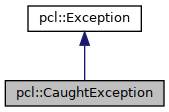pcl::CaughtException Class Reference
An exception that has already been handled. More...
#include <Exception.h>
 Inheritance diagram for pcl::CaughtException:
Inheritance diagram for pcl::CaughtException:Public Member Functions | |
| CaughtException ()=default | |
| CaughtException (const pcl::CaughtException &)=default | |
 Public Member Functions inherited from pcl::Exception Public Member Functions inherited from pcl::Exception | |
| Exception ()=default | |
| Exception (const pcl::Exception &)=default | |
| virtual | ~Exception () |
| virtual String | Caption () const |
| virtual String | ExceptionClass () const |
| virtual String | FormatInfo () const |
| virtual String | Message () const |
| virtual void | Show () const |
| PCL_FORCE_INLINE void | ShowOnConsole () const |
| virtual bool | ShowUnformatted () const |
Additional Inherited Members | |
 Static Public Member Functions inherited from pcl::Exception Static Public Member Functions inherited from pcl::Exception | |
| static void | DisableConsoleOutput (bool disable=true) |
| static void | DisableGUIOutput (bool disable=true) |
| static void | EnableConsoleOutput (bool=true) |
| static void | EnableGUIOutput (bool=true) |
| static bool | IsConsoleOutputEnabled () |
| static bool | IsGUIOutputEnabled () |
Detailed Description
CaughtException is used to signal exceptions requiring no additional processing. CaughtException is useful to terminate a process (by branching execution to a catch() block) without causing generation of further error messages.
Definition at line 637 of file Exception.h.
Constructor & Destructor Documentation
◆ CaughtException() [1/2]
|
default |
Constructs a CaughtException object.
◆ CaughtException() [2/2]
|
default |
Copy constructor.
The documentation for this class was generated from the following file:
